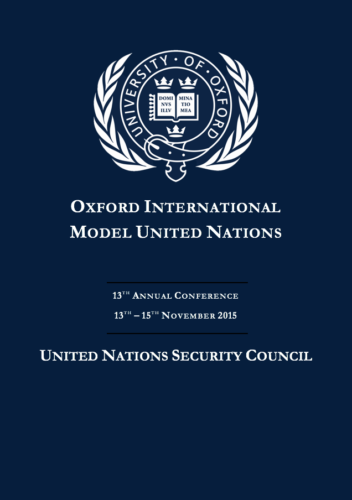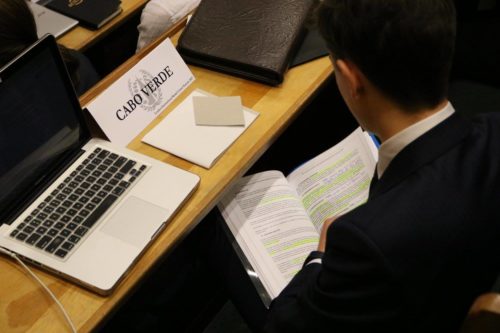Some of your delegates, for better or worse, won’t even read the study guide till the day of the conference, so having an excellent study guide is essential. Writing an excellent study guide will also give you the prerequisites into becoming an expert on the topic that your committee will be debating. This article will go through the typical structure of a study guide along with what is expected for each part, followed by DOs and DON’Ts.

The cover page of the Security Council Study Guide of OxIMUN 2015
Structure
A typical structure will be divided into the following sections:
Introduction to the Chairs
Self-explanatory, this is usually a friendly introduction to who you are and a general welcome to all of the delegates.
Introduction to the Committee
This section will highlight the history of your committee, significant achievements, where it is located and crucially the mandate and powers of your committee. Remember that not all delegates will know that only the Security Council can approve the use of force! Check out the research binders for a good understanding of what a committee introduction looks like!
Topic A
Introduction to the topic
An introduction should be short, concise and full of information on what the major issues of the topic are. In essence, it should read as a summary of the history and discussion sections of the study guide. Introductory phrases such as “There are approximately 370 million indigenous people, living in over 70 countries” paint a vivid picture to delegates who might not have studied the topic before. Providing definitions of the topic is also incredibly useful, just keep in mind whether the definition is approved by a UN body or not, as this could result in conflicts within the committee.
History of the topic
The history of the topic along with the discussion of the topic is the most important part of a study guide. These sections should be those which provide the most amount of information. Providing a historical context by highlighting what has occurred in the past at a UN and national level is vital in informing delegates what the issues of the topic are.
When did your problem first occur? Which actors have been involved in the past and present? Has the problem been reduced or increased over time? Are there any important UN missions and resolutions regarding your topic? These are all questions that must be answered in this section.
More general topics should also aim to name conflicts and humanitarian disasters which have occurred whilst linking to your topic so that delegates understand the relevance of certain events and how it has affected your topic.
At the end of this chapter in your study guide, your delegates should have an overview of the origins of your topic. It is vital that delegates have a good understanding of the present conditions so that they can find effective solutions to solve the problem. Be clear about historical facts to avoid a debate on the validity or truthfulness of facts rather than the best solutions to the current problems in your area. Ultimately your aim as a chair is to get delegates discussing important solutions to your topic.
Discussion of the Topic
This section will aim to discuss the issues within the topic itself. While the history of the topic provides a context, the discussion of the topic will look at the most controversial issues within the topic itself. International conflicts are generally caused by a multitude of problems. Therefore, looking at the controversial issues countries are facing will inform delegates on what the major problems are.
While you might have highlighted the history of UN actions in the previous sections, this is the section to debate whether these actions have been effective or not, along with the legality of state practice.
It is also worth considering the political objectives and motivations of individual actors within the most affected regions of your topic – from international organizations and NGOs, to member states.
Bloc positions
This sections principally aids your delegates in their research and guides them to what their country believes. Consider the various blocs that will have varying opinions on the topic you’re debating.
Questions a resolution must answer
This section is usually bullet pointed and must ask questions which need to be considered by delegates when finding the best solutions to the topic. Think about the main obstacles to your topic and how these need to be solved.
Bibliography
All study guides must be referenced in the fullest. At university, you are expected to reference essays fully either by using footnotes, or Harvard referencing. Therefore, providing a simple URL link is not sufficient. Wikipedia is also not allowed when referencing! You can use Wikipedia to get a general understanding of the topic, but you are generally not allowed to reference it. Research fully by looking at newspaper articles, UN and NGO reports as your main topics. Organisations like Human Rights Watch, International Crisis Group, Amnesty International and the International Committee of the Red Cross provide substantial reports on many of the world’s most difficult issues. Plagiarism is also not allowed by any standard and will regularly result in the disqualification of any chair from a conference.

Delegates will always refer back to the study guide to get a full understanding of the topic. Photo Credit: LIMUN 2017
DOs
- Research before writing. Having a good understanding of the topic as a whole before writing makes the writing process easier.
- Have a full range of sources. Only having newspaper articles from The Guardian or New York Times is not ideal. Whereas having newspaper articles along with UN and NGO reports will give a comprehensive picture of the issue.
- Include UN resolutions if possible! By having UN resolutions you’ll inform your delegates especially when it comes to looking at what actions the UN has taken, and whether these have been successful or not. It will also inform delegates on how their country as voted as they’ll be able to search up the voting record of each resolution provided.
DON’Ts
- Submit the study guide late! This might seem like an obvious point, but plenty of chairs do not submit their study guides in time. Waiting the day before the deadline to write the study guide is not good. You will only stress yourself out and your delegates will not get a good study guide in return.
- Plagiarism is considered to be one of the, if not the most severe offences in academia, it can result from disqualification from university courses, therefore plagiarism in study guides is extremely frowned upon.
- Be lazy with referencing. Referencing is a pain, but it’s necessary, so just do it. You are expected to reference correctly for university work, so do it for your MUN study guides.
Conclusion
MUN study guides are one of the most important tasks for chairs. By providing an excellent study guide, you are vitally informing your delegates of all the necessary requirements expected from them. Put effort into your study guides, reference them, and provide a full explanation of previous UN actions with regards to the topics.
In the next article, we will dig deeper into what makes a good chair an excellent one.


